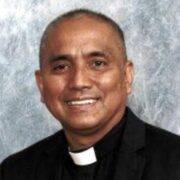“You shall shepherd my people Israel and shall be commander of Israel.” (2 Samuel 5:2)
In my prayerful moment, I often think of our political leaders and those running for government offices. Is their leadership motivated by the genuine call of God to serve our people, especially the poor and marginalized, and not on any selfish agenda? Do they exercise their roles within the perspectives of faith and belief in the Sovereign God?
Like us, political leaders are human beings with foibles and personal struggles. They may have strong leadership abilities but have flaws and a propensity to sin. They need our prayers.
It’s Pope Francis’ clamor to us—to pray for people in government, political leaders, and all those responsible for political institutions, nations, and regions. And so, in his Mass on November 16, 2022, in the Casa Santa Marta, he said that St. Paul, in his letter to Timothy (1 Tm 2:1-8) calls us to pray “for kings and for all in authority” so that we may lead a quiet and tranquil life in all devotion and dignity.”
Indeed, we must pray for our political leaders because the state of our nations, the world, and our financial and social lives depend on their leadership.
Pope Francis concluded his homily in Casa Santa Maria with these words:
“I ask you this favor: every one of you take five minutes, no more. If you are a leader, ask yourself: ‘Do I pray to the One who gave me power through the people.’”
“If you are not a leader, ‘Do I pray for my leaders? Yes, for this one and that one, because I like them, but for the one, no.’”
Religious leaders have the role and responsibility to prove the conscience of our leaders. They must co-exist and collaborate with political leaders to bring peace, justice, and equality. The Congress of leaders of the World and Traditional Religions on September 15, 2021, in Nur-Sultan, Kazakhstan, attended by Pope Francis, showed the importance of this role.
During this meeting, leaders of various world religions declared that “extremism, radicalism, terrorism and all other forms of violence and wars, whatever their goals, have nothing to do with true religion and must be rejected in the strongest possible terms.”
“We call upon world leaders to abandon all aggressive and destructive rhetoric which leads to destabilization of the world and to cease from conflict and bloodshed in all corners of the world,” the leaders said. And they asked “religious leaders and prominent political figures from different parts of the world to tirelessly develop dialogue in the name of friendship, solidarity, and peaceful co-existence.”
As we celebrate Christ the King at this end of the liturgical year, let’s pray for all leaders in the world, both political and religious. May they always listen to the voice of God, urging them to work for peace, justice, equality, and solidarity!
* * *
The opinions, beliefs and viewpoints expressed by the author do not necessarily reflect the opinions, beliefs and viewpoints of the Asian Journal, its management, editorial board and staff.
* * *
Fr. Rodel “Odey” Balagtas is the pastor of Incarnation Church in Glendale, California.






